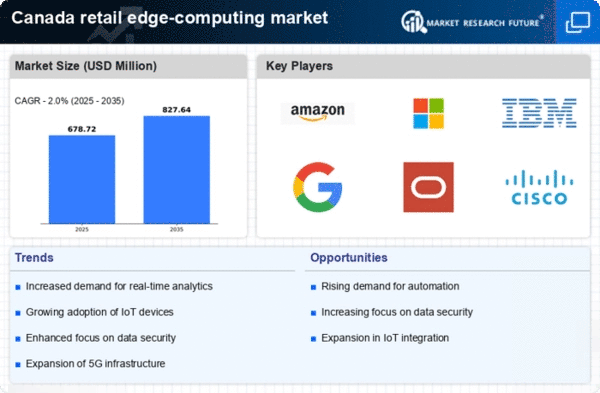Growing Demand for Real-Time Analytics
The retail edge-computing market in Canada is experiencing a surge in demand for real-time analytics. Retailers are increasingly seeking to leverage data at the edge to enhance decision-making processes. This trend is driven by the need for immediate insights into customer behavior and inventory management. According to recent data, approximately 70% of Canadian retailers are investing in edge-computing solutions to facilitate faster data processing. This shift allows businesses to respond promptly to market changes, optimize supply chains, and improve customer experiences. As a result, the retail edge-computing market is likely to expand significantly, with projections indicating a growth rate of around 25% annually over the next five years. The ability to analyze data in real-time is becoming a critical differentiator in the competitive retail landscape.
Integration of AI and Machine Learning
The integration of artificial intelligence (AI) and machine learning (ML) into the retail edge-computing market is emerging as a pivotal driver. Canadian retailers are increasingly leveraging these technologies to enhance data processing capabilities and automate decision-making. By utilizing AI and ML algorithms at the edge, businesses can analyze vast amounts of data in real-time, leading to improved inventory management and customer insights. Current estimates suggest that the adoption of AI-driven edge-computing solutions could increase operational efficiency by up to 50%. This trend indicates a shift towards more intelligent retail environments, where data-driven insights are readily available. As AI and ML technologies continue to evolve, their integration into the retail edge-computing market is expected to accelerate, further transforming the retail landscape.
Enhanced Customer Experience Initiatives
In the retail edge-computing market, enhancing customer experience is a primary driver of growth. Canadian retailers are increasingly adopting edge-computing technologies to provide personalized shopping experiences. By utilizing data collected at the edge, retailers can tailor promotions and recommendations to individual customers, thereby increasing engagement and sales. Reports suggest that retailers implementing these technologies have seen customer satisfaction scores rise by up to 30%. Furthermore, the integration of edge-computing solutions allows for seamless omnichannel experiences, where customers can interact with brands across various platforms. This focus on customer-centric strategies is expected to propel the retail edge-computing market forward, as businesses recognize the importance of meeting evolving consumer expectations in a digital-first environment.
Regulatory Compliance and Data Governance
Regulatory compliance is becoming increasingly critical in the retail edge-computing market. Canadian retailers must navigate a complex landscape of data protection regulations, which necessitates robust data governance strategies. The implementation of edge-computing solutions can aid in compliance by ensuring that data is processed and stored in accordance with local laws. As data privacy concerns grow, retailers are investing in technologies that enhance their ability to manage sensitive information effectively. Reports indicate that compliance-related investments in the retail sector are projected to increase by 20% over the next few years. This focus on regulatory adherence not only mitigates risks but also builds consumer trust, thereby driving growth in the retail edge-computing market.
Cost Efficiency and Operational Optimization
Cost efficiency is a significant driver in the retail edge-computing market, particularly in Canada. Retailers are increasingly recognizing the potential of edge-computing solutions to reduce operational costs. By processing data closer to the source, businesses can minimize latency and bandwidth usage, leading to lower overall IT expenses. A study indicates that companies adopting edge-computing technologies have reported cost reductions of up to 40% in data management. This operational optimization not only enhances performance but also allows retailers to allocate resources more effectively. As the retail landscape becomes more competitive, the emphasis on cost efficiency is likely to drive further investments in edge-computing solutions, thereby fostering growth in the retail edge-computing market.
















